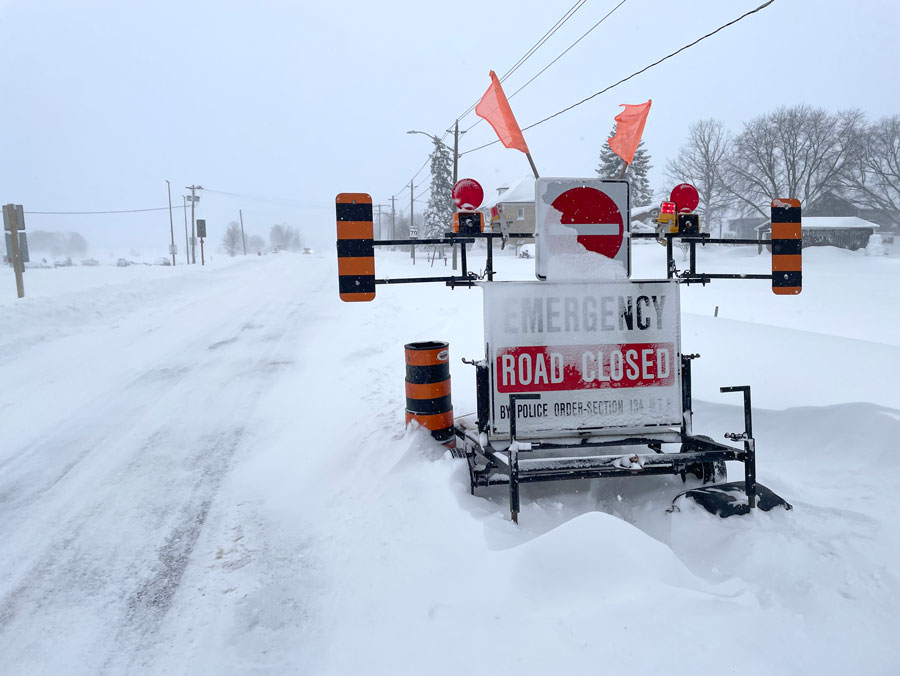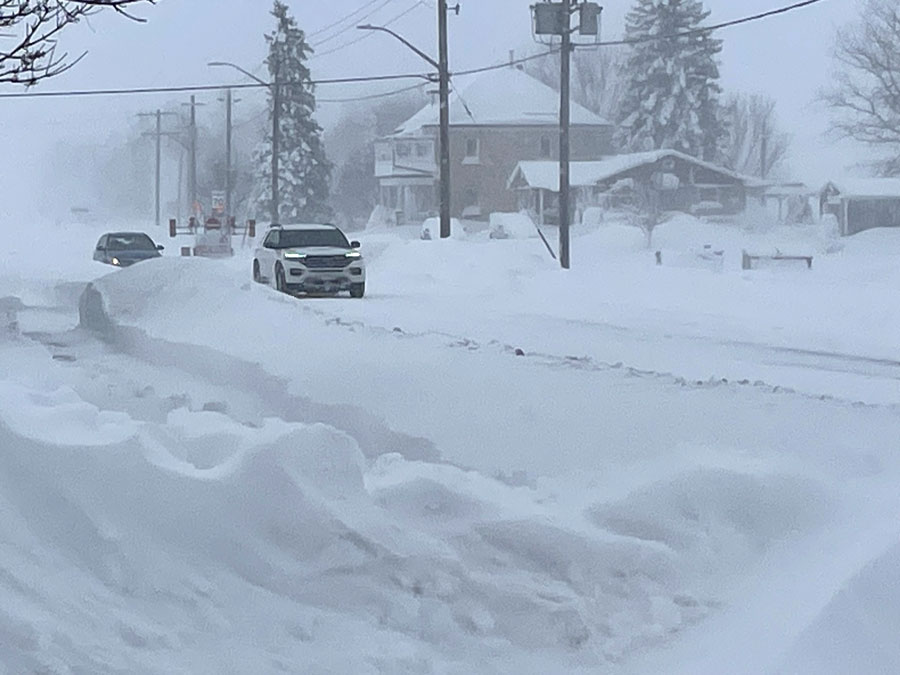WELLINGTON COUNTY – A major snowstorm disrupted Christmas plans and stranded travellers across the region between Dec. 23 and 26.
Environment Canada issued a major storm warning days in advance of the weather event, predicting snowfalls between 15 to 50cm by Boxing Day in a winter blast expected to include winds up to 100km/h at times.
The storm created blizzard-like conditions and hazardous driving conditions, which resulted in closed roads and facilities and caused numerous power outages.
Wellington County OPP report no one was seriously injured, but police responded to hundreds of calls across the county during what was likely the worst winter storm here in several years.
Spokesperson Josh Cunningham said local OPP received over 500 calls over the four-day storm, about 200 of them likely directly linked to the weather.
The County of Wellington declared a “significant weather event” around 10am on Dec. 23.

Road closed – A roadblock at the edge of Harriston advised motorists that access to Highway 23 and Wellington Road 87 was closed on Dec. 25 due to a multi-day winter storm. Photo by Patrick Raftis
Several other county municipalities made similar declarations, including all three north Wellington municipalities.
A municipality can declare a significant weather event when a weather hazard is approaching or occurring and has the potential to pose a significant danger to users of roads. The declaration allows county operations additional time to address the weather issues and remain in compliance with the province’s Minimum Maintenance Standards regulation.
Plows were pulled off the roads at certain points in the storm in some municipalities.
Mapleton ended its significant weather declaration on Dec. 27, while Minto and Wellington North ended their events on Dec. 28. Wellington County ended its significant weather declaration on Dec. 26.
Libraries and landfill sites across the county were closed during the storm.
“Without a doubt, the severe weather significantly impacted emergency services,” Cunningham stated in a Dec. 29 email.
“We’d like to thank all those who did take warnings seriously, it allowed services to work at full tilt.
“We had plenty of drivers who learned a valuable lesson about winter driving and thankfully it didn’t come at the cost of any lives.”
Cunningham explained the 200 or so calls related to the storm included those about dangerous conditions, abandoned vehicles, collisions, towed vehicles, traffic complaints, traffic control requests, and traffic hazards.
He added police officers focused on “engaging and educating drivers” charged with driving on a closed highway.
“Due to sheer volume of drivers disobeying closed road prohibitions and the high call volume, there was no way to accurately measure the number of drivers who disobeyed closures,” Cunningham stated.
Among the events disrupted by the storm in northern Wellington was the Andersons’ Community Christmas, planned for Dec. 25 at the Harriston-Minto Community Centre.
The event, open to anyone wishing to share a Christmas dinner with others, generally attracts hundreds of diners and organizers deliver meals to some who can’t make it.
The event was switched to a take-out only event on Dec. 27, with meals also delivered to those who needed the service.
Organizer Jean Anderson said over 270 meals were served thanks to numerous volunteers who turned up to help.
She said many of those receiving delivered meals were “still digging out” of their driveways on Dec. 27 and appreciated the hot meal delivery.
Weather turned warmer and rainy in the days following the storm, quickly melting much of the recent snowfall, prompting both the Maitland Valley Conservation Authority and Grand River Conservation Authority (GRCA) to warn of the possibility of “minor flooding.”
Another weather system was expected to bring up to 30mm of rainfall to southern Ontario on Jan. 3 and 4, states a Jan. 1 press release from the GRCA.




